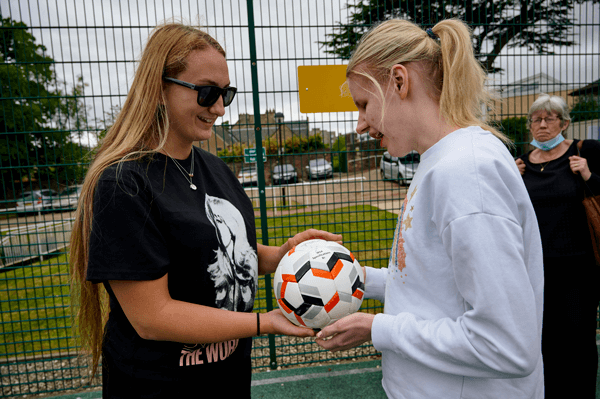A blind woman footballer from Edinburgh was left traumatised after she feared falling in front of a speeding train when rail staff never showed up to help her.
Samantha Gough – who plays blind football for England despite being a Scot – booked assistance before starting her journey at Edinburgh Waverley, but when she got to Doncaster station enroute to a competition, no-one was there to help. The station also did not have tactile paving – a system of textured ground surface indicators on platforms to assist the visually impaired.
Samantha, 20, from Lasswade, Midlothian, who attended the Royal Blind School in Edinburgh, said: “It was a nightmare, a really horrendous situation to be in. People have died falling on the tracks before and I thought it was about to happen to me. I was in full panic mode and there was not one person there to help despite me booking assistance before I set out. I waited for about five minutes and then really began to panic. I had no idea how close I was to the platform edge as there was no tactile paving.

“Fast trains were screaming past with the wind hitting me and despite screaming on the platform for help, no one heard. I called my mum at home in Scotland and she had to phone the police. A few trains later, a guard got off and asked if I was ok and took me to station staff. They said my assistance request was not on the system but I had been told at Edinburgh that staff were phoning Doncaster to inform them that I was on the way.”
The news comes as train operators are preparing to cut 2000 staff in line with plans to close almost every train station ticket office in Britain. Rail companies have already outlined proposals to make thousands of job cuts by October – even though the UK government is yet to approve the planned ticket office closures. Plans to close 974 out of 1007 railway station ticket offices were first announced by industry body Railway Delivery Group in July. Scotland's busiest station, Glasgow Central, which serves 15.3 million passengers each year, could also lose its ticket office.
She added: “I was travelling on to an event in Conisbrough. I was just left outside Doncaster station in a distressed state and had to wait for someone to come and get me from Conisbrough. It is a disgrace and has really knocked my confidence. It has really made me think twice about going anywhere without support.”
Samantha has been visually impaired from birth due to cerebral visual impairment (CVI), a condition which means the eyes are healthy but the brain’s visual pathways do not work, resulting in sight loss. She competes in a number of sports and plays for the England women’s blind football side as Scotland does not have a team in the sport. Last year, Samantha, who is severely sight impaired, competed in the European Para Youth Games and was the only Scot representing her country at goalball. She scooped bronze with Team. The para sport consists of three players on each side of the court, with 18 metres wide goals at either end. Players use a blue ball with bells in it which is thrown by hand and never kicked.

Samantha said: “We complained about this situation and we were offered two first class tickets as compensation. But I don’t want to go near their trains after my experience so it completely misses the point. This is the most extreme situation I have faced on the train. Sports people need to use the rail network all the time to get to training and events. There is a real issue here about accessibility and fairness. It really is a disgrace.”
Midlothian MP Owen Thompson has written to LNER demanding action. He said: “I was extremely concerned to hear about this constituent’s traumatic experiences. It is simply unacceptable. I find it hard to comprehend how something like this can happen in this country in the 21st century.
“There is a real issue about accessibility, equality and fairness here. Blind and partially sighted people should be able to travel safely and comfortably at all times. I wrote to LNER a couple of weeks ago and have still to receive a response. I am concerned that tactile paving is not an essential at every station in the UK.
“I do not think that the Secretary of State for Transport’s statement that tactile paving will appear in all mainline railway stations in Britain by the end of 2025 at the latest is good enough. Samantha has my full support. We have already met with Samantha and her mum to hear their concerns and I will stay in touch as we battle to get this resolved.”
Craig Spalding, chief executive of Sight Scotland, said: “We’re deeply concerned at Sam’s experience and the dangerous situation she was left in. Being left without any assistance and on a platform with no tactile paving highlights just how inaccessible travelling can be for people with visual impairments. Sadly, train journeys like this are not uncommon for blind and partially sighted people.
“We’ve heard first hand of other cases where people have waited for assistance to arrive and nobody turn up. This has a knock-on effect on someone’s confidence to travel independently and being able to safely get from A to B. Urgent action is needed now to ensure all train stations have tactile paving, in person ticket booths and assistance to ensure rail travel is accessible for all.”



